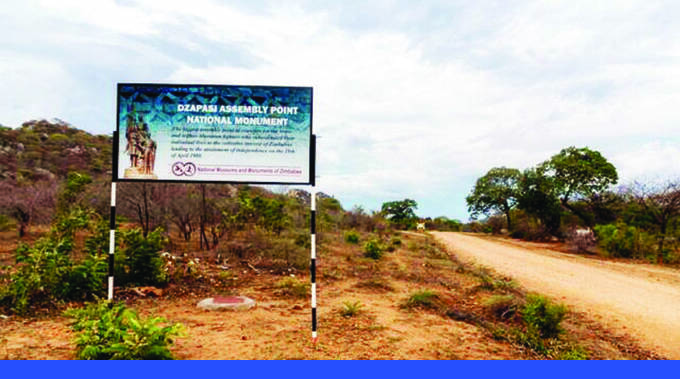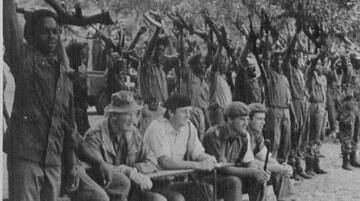
The Sunday Mail

Political Editor
NEIGHBOURING Mozambique gained its independence on June 25, 1975, heralding the emergence of another frontier from which freedom fighters would launch incursions into then-Southern Rhodesia (now Zimbabwe) to overthrow the racist white minority government.
After setting up base in Maputo, thanks to the efforts of then-Zimbabwe African National Union (ZANU) Secretary for Finance Cde Chrispen Mandizvidza, who managed to get assistance from Portuguese-educated Mozambican businessman Mr Dave Popatlal, guerilla fighters began progressively liberating swathes of territory in Zimbabwe.
And Manicaland, including Buhera district, became the main thoroughfare for the Zimbabwe African National Liberation Army (ZANLA).
But it did not only offer safe passage, but a sanctuary and recruiting ground for the liberation movement, thus its central role in the history of Zimbabwe’s independence.
The Government’s recent decision to hold the main Independence Day celebrations in Murambinda, Manicaland province, has, therefore, since been described as fitting.
“As Zimbabwe celebrates its Independence Day, Buhera serves as a powerful reminder of the sacrifices made and the hard-won freedom cherished today,” said Cde Douglas Mahiya, ZANU PF’s Secretary for War Veterans Affairs in the Politburo.
“The people of Buhera responded well to the liberation as the area had a high number of recruits and war collaborators; this is why Dzapasi became the largest assembly point.
“We want to applaud the President for his wisdom in honouring the people of Buhera and connecting them back to the revolution. This is democratic centralism that allows connection between the top leadership and lower echelons of society. Hosting the celebrations in Buhera isn’t just symbolic; it’s a homecoming.”

It is believed the sheer number of liberation fighters at Dzapasi Assembly Point, believed to be more than 5 000, indicated the scale of operations in the area and extent of guerilla incursions into Zimbabwe’s heartland.
After the basic agreement on the ceasefire between the warring parties was reached on December 5, 1979 (the 86th day of the Lancaster House Conference), the Rhodesian security forces and the Patriotic Front (PF) — an alliance between ZANU and the Zimbabwe African People’s Union — had to stop all cross-border military undertakings on December 21,1979.
From December 29, 1979 to January 4, 1980, armed freedom fighters were all required to enter the nearest of the 16 assembly points (APs).
It is estimated that about 15 730 PF fighters had gathered in APs by January 7, 1980.
However, the number had swelled to 30 000 by the time of the February 27-29 elections.
And the Dzapasi Assembly Point in Manicaland had the highest number of comrades.
The two ZANLA representatives who were appointed as PF commanders at the camp were Cde Tonderai Nyika (the late Paradzai Zimondi, who was Zimbabwe Prisons and Correctional Service Commissioner-General) and Cde Gibson Gumbo.
In fact, in February 1980, it was the site of the symbolic handshake between ZANLA Commander Cde Rex Nhongo (Solomon Mujuru) and Rhodesian army commander Major-General Bert Barnard.
It was also an epochal moment, which marked the lowering of the Union Jack and hoisting of the Zimbabwe flag, signifying an end of an era for the Rhodesians and a new dawn for Zimbabweans.
National Museums and Monuments of Zimbabwe’s eastern region acting director Mr Lloyd Makonya said Dzapasi, which was first known as Foxtrot Assembly Point, is a significant signpost of Zimbabwe’s independence.
“Prior to its selection as an assembly point, Dzapasi was previously used by the Rhodesian army. Buhera was largely regarded by the Smith regime as notorious for churning out a large number of freedom fighters. The base was used by the Rhodesian forces to curb the spiralling numbers of freedom fighters from Buhera district,” he said.
“Dzapasi turned out to be the biggest in terms of the number of returning comrades who assembled at the base. At the height of its occupation, more than 5 000 freedom fighters are believed to have assembled at Dzapasi.”
The assembly point, he added, played a central role in the integration and building of a new Zimbabwe Defence Forces.
“The site is a representative sample of the camps set up throughout the country, marking the end of the armed struggle and transition to independence and a new united fighting force for Zimbabwe,” Mr Makonya said.
“It was also at Dzapasi that the ZANLA Commander Cde Rex Nhongo and the Rhodesian army commander Bert Barnard ceremoniously shook hands as the British flag was lowered and the Zimbabwean flag hoisted in February 1980. This was one of the first ceremonies heralding the birth of an independent Zimbabwe and signalled the death of Rhodesia’s military machine. Thus, the military supremacy of Ian Smith’s army was formally and finally relinquished at Dzapasi.”
One of the war veterans who assembled at Dzapasi, Cde Edmore Nemaunga, whose Chimurenga name was Cde Kudzai Hondo, said he has a lot of memories from the period.
“It was a huge camp. I stayed there for about a month and made friends with a lot of comrades. Cde Rex Nhongo regularly asked us to do military drills to show the Rhodesian commanders that we were not just guerillas, but proper soldiers who could be attested into the new national defence forces.”
ZANU PF War Veterans League’s Secretary for Administration Cde Richard Chirongwe, who was a commander during the liberation struggle, said he visited Dzapasi in early 1980 to select cadres who would join the Air Force of Zimbabwe.
“At that time, the air force was full of Rhodesian soldiers. So, we wanted our men to be part of it. I selected eight men to join the air force. We were looking for cadres who had experience in aviation, radar and air defence skills.”
Chairperson of the Zimbabwe National Liberation War Veterans Association in Manicaland Cde Gift Kagweda, whose Chimurenga name was Cde Maybe Tanzania, said war veterans in the province are delighted that Buhera district has been chosen to host the grand national event.
“We want to thank President Mnangagwa for his wisdom in deciding to celebrate the national holiday around the country, and not just in Harare.
“For us war veterans, the independence holiday is the ultimate celebration of what we fought for. We suggest that for this year’s special edition, some comrades who fought in Buhera and those who reside in Buhera should be rewarded with medals.
We have some comrades who fought in Buhera or are living in Buhera . . . The local authority can also help to identify these comrades and honour them . . .”






